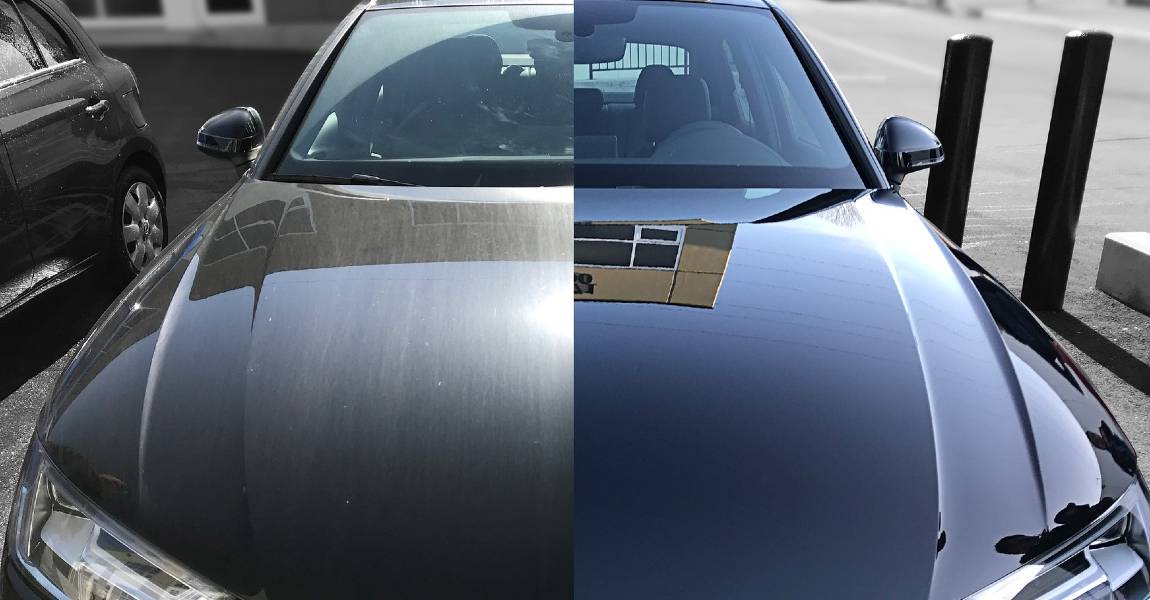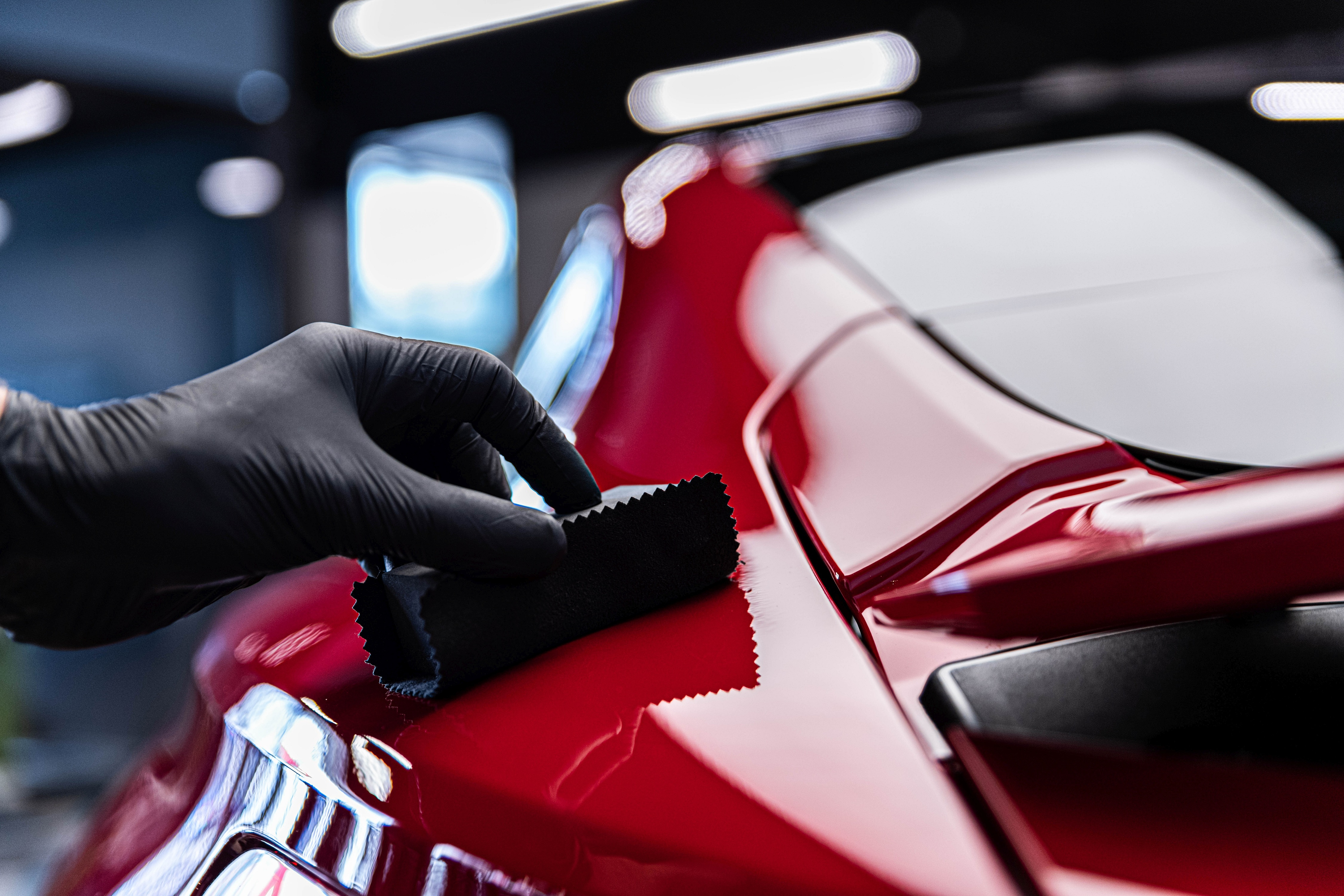Exploring the Different Sorts Of Ceramic Coating for Your Car's Defense
When it concerns protecting your car, ceramic finishings can be a game changer. They offer a long lasting guard against dust, UV rays, and scrapes, improving your automobile's appearance. With so several alternatives available, exactly how do you recognize which one fits your demands? Understanding the distinctions in types and applications can help you make an educated selection that stabilizes security and appearances. Let's explore what establishes these coverings apart.
What Is Ceramic Coating?
Ceramic coating is a fluid polymer applied to your car's outside, developing a safety layer that bonds with the paint. This advanced modern technology boosts your vehicle's surface, using a sturdy shield against environmental pollutants like dirt, gunk, and UV rays. When you apply ceramic coating, you're not simply including shine; you're also enhancing the longevity of your automobile's paint job.Unlike typical wax or sealers, which disappear gradually, ceramic coverings offer long-lasting defense that can sustain for several years with correct upkeep. The application procedure usually includes extensive cleansing and polishing to ensure an excellent bond. After using the coating, it remedies to develop a hard shell, enhancing hydrophobic properties that repel water and dust. This indicates washing your car ends up being simpler, and you can enjoy a consistently clean appearance. Buying ceramic coating is a positive way to maintain your vehicle's aesthetic charm and worth.
Benefits of Ceramic Coating

Kinds of Ceramic Coatings
When thinking about ceramic finishings, you'll find both expert and do it yourself choices available. Each kind provides various levels of surface security, accommodating different demands and budget plans. Recognizing these differences can help you select the right coating for your automobile.
Professional vs. DIY Options
While you could take into consideration applying a ceramic coating on your own, selecting expert setup can provide distinctive benefits. Specialists have accessibility to high-grade items and the proficiency to assure a flawless application. They understand the required prep job, that includes detailed cleaning and surface improvement, to optimize the coating's effectiveness.On the various other hand, do it yourself alternatives can conserve you some money, and lots of sets are created for ease of usage. Without the right devices and expertise, you take the chance of unequal application or even damage to your car's paint.Ultimately, if you want the ideal results and long-lasting security, spending in professional installation could be worth it. It's about balancing your budget with the degree of high quality and security you prefer.
Surface Protection Levels
Ceramic finishings been available in various kinds, each providing different levels of surface area security for your vehicle. You'll generally encounter 3 major classifications: entry-level, mid-range, and premium finishings. Entry-level choices provide standard security versus dust and UV rays, ideal for those who desire a basic service. Mid-range finishings improve sturdiness, offering far better resistance to scratches and chemicals while adding a noticeable sparkle. Premium finishes, typically applied by specialists, provide exceptional security against extreme problems, consisting of heavy climate and commercial contaminants. These innovative products can last numerous years, making them a beneficial financial investment. Selecting the right degree of protection depends upon your vehicle's requirements, your driving routines, and just how much upkeep you agree to dedicate to in the future.
Do it yourself vs. Specialist Application
When thinking about ceramic coating for your vehicle, you'll require to evaluate the expense of do it yourself versus professional application. While DIY can save you cash, it likewise calls for a certain ability degree to accomplish the preferred outcomes - Ceramic Coating St Louis Park. Understanding these elements will certainly help you make an educated selection that matches your demands
Price Contrast
Selecting in between a DIY ceramic coating application and employing a specialist can significantly affect your budget plan. Do it yourself kits commonly range from $50 to $200, making them an appealing alternative for those wanting to save money. Nevertheless, you'll need to evaluate the cost of your time and any kind of extra devices or products you could require. On the other hand, expert applications can cost anywhere from $500 to over $2,000, depending upon the quality of the item utilized and the dimension of your automobile. While the ahead of time price is higher, experts usually provide warranties and use higher-grade products, which can conserve you money on maintenance over time. Eventually, weigh your budget against the value of your time and experience.
Ability Degree Required
While you may be lured to tackle a ceramic coating application on your own, it's vital to review your ability level and experience. Applying ceramic coatings needs an eager eye for detail, correct surface area prep work, and an understanding of the application process. If you're not positive in your capabilities or do not have the right devices, you may wind up with irregular insurance coverage or damage to your vehicle's paint.On the other hand, hiring a specialist can conserve you time and disappointments - Ceramic Coating St Louis Park. Experts have the know-how and devices to guarantee a remarkable application, taking full advantage of the coating's long life and efficiency. Ultimately, consider your experience and resources carefully prior to making a decision whether to go the do it yourself route or look for a pro's help
Just how to Select the Right Ceramic Coating
Exactly how do read here you assure you're choosing the very best ceramic coating for your automobile? Start by considering your specific demands. Think concerning your driving routines, environment, and how frequently you clean your vehicle. If you drive in rough conditions or regularly encounter road particles, search for a coating understood for durability and scratch resistance.Next, research various brands and their product testimonials. Some finishings supply much better hydrophobic buildings, making it simpler to drive away water and dirt. Furthermore, inspect the service warranty-- credible brands normally give a longer warranty period, suggesting confidence in their product.Finally, take into consideration professional vs. DIY application. While specialist layers might be costlier, they typically produce premium outcomes as a result of advice expert application. If you choose do it yourself, verify you follow all directions very carefully for the very best end result. By examining these factors, you'll make an informed decision that best suits your vehicle and lifestyle.
Upkeep Tips for Ceramic Coated Autos
After picking the ideal ceramic coating for your automobile, keeping it properly maintained is vital to optimizing its advantages. Begin by washing your vehicle on a regular basis utilizing a pH-neutral soap and a soft microfiber cloth to prevent scrapes. Prevent automated vehicle cleans with brushes, as they can harm the coating.Once your car is clean, completely go to website dry it completely to stop water areas. Consider using a ceramic maintenance spray every couple of months to improve the coating's hydrophobic residential properties and shine.Inspect your coating regularly for any type of indications of wear or damage, and do not be reluctant to retouch any type of impacted locations (Ceramic Coating St Louis Park). Additionally, vehicle parking in shaded locations or using an automobile cover can help protect against UV rays and environmental pollutants
Typical Misconceptions About Ceramic Coatings
Many vehicle proprietors believe that ceramic finishes make their vehicles totally scratch-proof and maintenance-free, but that's much from the truth. While these finishes offer exceptional protection against minor scratches and ecological contaminants, they don't make your paint untouchable. You still require to be cautious and prevent abrasive materials.Another usual misconception is that ceramic layers last permanently. Actually, while they're durable, they do break down with time and may require reapplication every couple of years relying on factors like climate and maintenance.Many believe that as soon as they have actually used a ceramic coating, they can miss normal washing. This isn't true; dirt and gunk can collect, so normal cleaning is crucial for keeping that protective layer.Lastly, some think ceramic finishings are a do it yourself job. While there are packages readily available, specialist application often generates better results, guaranteeing appropriate bonding and protection.

Often Asked Inquiries
For How Long Does Ceramic Coating Last Prior To Requiring Reapplication?
Ceramic coating generally lasts in between two to five years, depending upon the item and upkeep. Regular cleaning and appropriate treatment can expand its lifespan, however you'll intend to reapply it for excellent protection gradually.
Can Ceramic Coating Be Applied Over Existing Paint Defense Movies?
Yes, you can apply ceramic coating over existing paint defense movies. Simply ensure the movie's surface area is clean and in good problem. This combination enhances security and provides your automobile a glossy, sturdy surface.
Is Ceramic Coating Safe for All Automobile Surfaces?
Yes, ceramic coating's secure for the majority of vehicle surfaces, including paint, steel, and glass. It's ideal to avoid porous materials or certain plastics. Always examine supplier standards to verify compatibility with your car's certain surface areas.
What Is the Expense Variety for Professional Ceramic Coating Services?

Can Ceramic Coatings Be Gotten Rid Of, and How Is It Done?
Yes, ceramic finishings can be eliminated. You'll normally need a strong solvent or rough technique. It's finest to get in touch with a professional for risk-free removal, ensuring your car's paint remains intact and undamaged throughout the process.